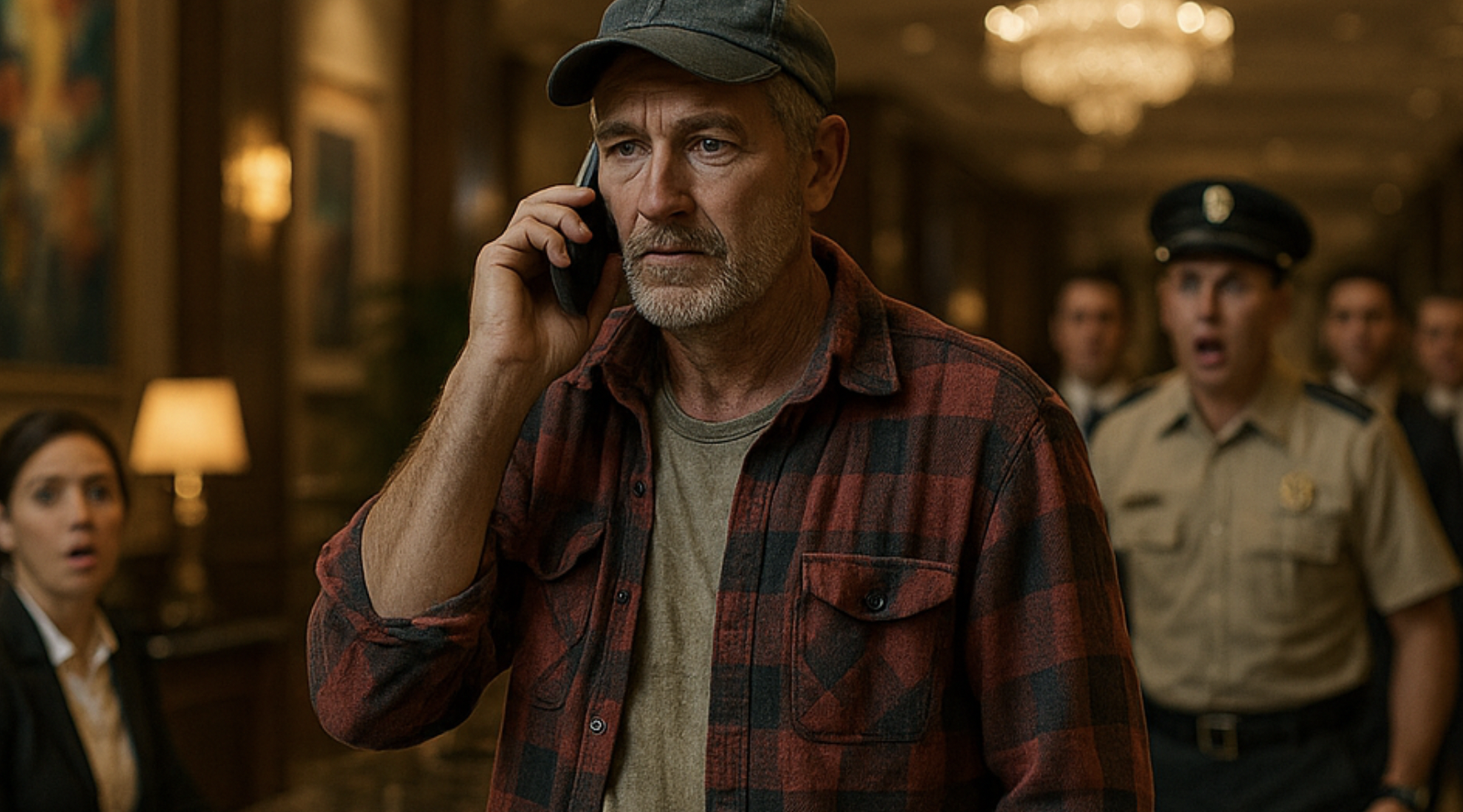Late in the afternoon, the Regency Grand Hotel’s revolving doors in Dallas whispered around and released a man in his fifties into the lobby. His skin carried the bronze of a lifetime beneath the Texas sun; a faded denim jacket, smudged with soil, hung off his shoulders; old leather boots wore the chalky memory of dirt roads. He looked like what he was—a farmer who had stepped straight off his land.
His name was Thomas Miller.
Thomas made an unhurried path toward the marble front desk. Light from crystal chandeliers draped the room in a warm glow, catching on designer furniture and the polished brass of luggage carts. Guests lounged in velvet chairs, cocktail glasses flashing like jewels in manicured hands. Tailored suits, glittering gowns, murmured laughter—the difference between him and everyone else might as well have been a velvet rope.
“Good evening,” Thomas said, voice steady and courteous. “I’d like to rent a room for the night.”
The receptionist—a young woman with a name tag that read HEATHER—looked him over, top to toe, her lipstick a perfect line that curved into a skeptical pout. To Heather, this five-star refuge was designed for the sleek and the powerful—not for dusty boots and weathered palms.
“Sir,” she replied coolly, “this hotel is very expensive. I don’t think it’s the right fit for you. There’s a budget motel down the street. That would be more appropriate.”
Thomas’s smile held, touched with a quiet sadness. “I understand. But I’d still like to stay here, if possible. Any room will do.”
Her tone sharpened, frost edging every syllable. “As I said, our property caters to business professionals and luxury travelers. Please don’t waste my time. Try somewhere else.”
A couple of guests nearby chuckled behind raised glasses, trading glances that said it all: a man out of place, angling above his station.
Thomas paused. He did not argue or bristle. Yet the air seemed to thicken; even the elderly security guard by the door shifted on his feet, sympathy flickering across his face though he kept his distance.
Then Thomas slid a new smartphone from his pocket. No drama, no sigh. He dialed, spoke softly, firmly: “Hi. I’m in the lobby. The staff isn’t allowing me to book a room. Could you come down and give me a hand?”
Heather rolled her eyes, certain it was a bluff. But minutes later, the elevator chimed and opened—and the temperature of the room changed.
Out stepped David Lawson, the hotel’s general manager. Young, immaculate, confident—the sort of man staff adored and guests trusted. His gaze found Thomas. His expression broke open in recognition.
He hurried across the marble and, to the astonishment of the onlookers, inclined his head in deference. “Mr. Miller! Why didn’t you tell us you were coming? One call and I would’ve had everything arranged.”
The lobby stilled. Conversations snapped off mid-sentence. Heather’s lashes fluttered as if she’d misheard.
David turned toward her, his jaw set. “This gentleman is not merely a guest. He is the reason this hotel exists. He is my family’s benefactor.”
“I—I didn’t know,” Heather stammered. “He just… he looked—”
Thomas lifted a hand, gentle but firm, and her apology withered on his lips. “It’s alright,” he said, calm filling the silence. “We all make mistakes. But next time, try not to judge so fast—by clothes, or by a person’s job.”
David faced the room, voice thick with feeling. “Years ago, when my father’s company collapsed, Thomas Miller lent us money without hesitation. Because of him, my family stood back up. I got a second chance. Without his kindness, this hotel wouldn’t stand where it does today. We owe him more than we can ever repay.”
A ripple moved through the bystanders—shock, then shame, then something like respect. The man they’d quietly mocked had just been revealed as the quiet hand that saved the hotel’s very foundation.
Heather went pale, moisture gathering at the corners of her eyes. She saw, suddenly and painfully, how arrogance had narrowed her sight.
David rested a grateful hand on Thomas’s shoulder. “From this moment on, you are our most honored guest. Always.”
The shift was immediate. Staff sprang into motion—apologies, cold towels, a silver tray with refreshments. The same guests who had smirked now watched with lowered eyes and thoughtful faces.
David escorted Thomas toward the elevators, ignoring forms and formalities. “We’ve prepared the presidential suite for you,” he said warmly. “It’s the least we can do.”
Thomas paused and turned back to the lobby. The lines of his sun-etched face softened. “Friends,” he said, “don’t trust appearances. A farmer may one day be your benefactor. A laborer may carry stories you can’t imagine. Respect costs nothing—and it means everything.”
His words drifted up into the chandelier light and hung there. Heads bowed; glasses were set down. Heather blinked back tears. Something in her shifted. From that day on, she greeted every arrival—polished or dusty, jeweled or plain—with patience, humility, and real care.
Thomas spent a quiet night in the best room the hotel could offer. At first light, he slipped out without ceremony, steering his truck toward the small farm on the city’s edge.
The lobby staff watched him pass into the morning, a simple man returning to a simple life. But he left them something finer than wealth or power—a lesson they would carry far longer than any reservation number:
Never judge by the surface. True worth runs deeper, often hidden beneath the dust of an honest day’s work.
